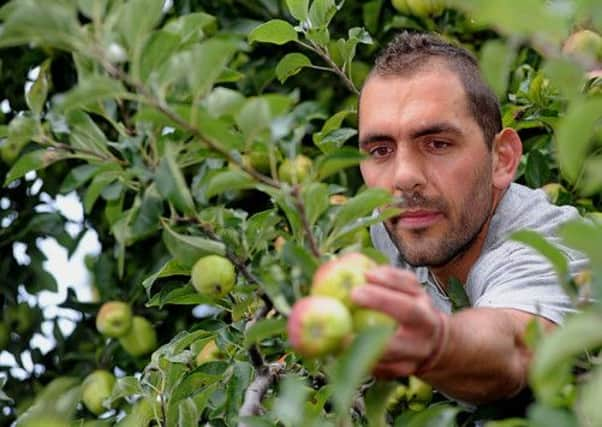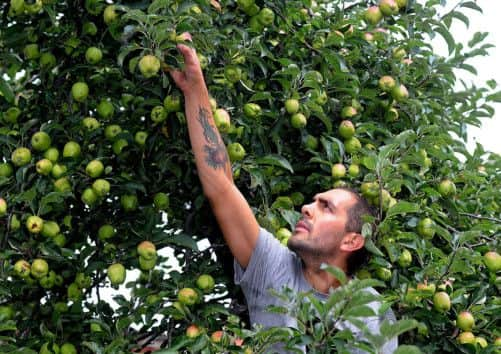Back to nature idea that’s bearing fruit


WE’VE all seem them. The trees in gardens and orchards, groaning with fruit and no one picking.
Now, however, armies of volunteers are springing up across the country to pick the fruit and veg no one seems to want and all thanks to a pioneering Sheffield scheme.
Advertisement
Hide AdAdvertisement
Hide AdAbundance, started by the enterprising artist, dancer and environmentalist Anne Marie Culhane, came out of Grow Sheffield, which was founded in 2007, and has now spread to many other towns and cities, not just in Yorkshire but all over the UK.


Project leader Daniele Rinaudo believes more people should get involved with scheme like Abundance to help get them back in touch with nature.
“Today,” says Daniele, who’s South Yorkshire born and bred, but has an Italian father, “we live a lot in a ‘supermarket culture’ where, if the carrots aren’t beautifully shaped and of uniform size, we just don’t want to put them in our shopping trolley. If there’s dirt on the celery, well, that’s not going to find its way to the check-out.
“What people have to realise is that dirt can be washed off, that the tomato that is an odd shape on the vine is going to be a darned sight more tasty than the one in the Styrofoam tray with the plastic clingfilm over it. Better yet, a lot of the fruit that is available at this time of year is...here’s the word we love…free!”
Advertisement
Hide AdAdvertisement
Hide AdDaniele, 29, went to university and studied Contemporary Photographic Practice, then he went travelling for a year or so. He returned to Sheffield, and became more and more interested in the work that Abundance was doing in the community. On his travels, working on an organic farm also sparked his interest in new ways of growing crops, and in simple sustainability. Grow Sheffield was designed to connect people to each other, to their environment, and to the seasons when fruit and vegetables are available and harvested. It constituted itself formally, got a little funding from local government and the Arts Council and began to grow. Six years on, and enthusiastic volunteers are now sharing their desire to do something positive about the fruit that is just there for the taking in their parks, gardens and neighbourhoods generally.
The volunteers get the fruit that they harvest into schools, community centres, hospices, care homes and all manner of outlets. “One supply of apples last year went into a Sheffield library, and was a bit of an experiment,” says Daniele.
“We simply didn’t know if people going in would be even vaguely interested. But after a few hours, we got a call saying: ‘We’ve run out – they’ve all gone. Have you got any more?’ And it turned out to be a runaway success.”
Volunteers across the schemes in Britain, there are some 100 active in Sheffield, and about another 400 on the email list, reach out into their communities in many different ways.
Advertisement
Hide AdAdvertisement
Hide AdOne of the first tasks for all groups is to make a detailed reference map of all the trees within their catchment area, and to see how they might help toward the harvest. Groups lobby local government to open up more land for allotments, so that people can grow their own food all the year round. They bottle their produce and pass it on, any small profits are ploughed straight back into their “parent groups”. They learn to identify trees and bushes. They plant new trees, and sow new crops. Almost 150 new trees were planted in Sheffield in 2012. They learn how to graft, and to prune properly. They regularly swap recipes. They all have one thing in common – making the very best of the land around them, and using what it produces to its fullest extent. “It’s an educational thing at its heart: passing on the knowledge and the culture of growing and eating,” says Daniele. “Once, it was your granddad, in his garden, telling you what this or that was, and how you could eat it or cook it. That’s very nearly been totally lost – but Abundance and organisations like it are, I think, slowly, very slowly, turning the tide. Abundance is a simple and very natural way for people to reconnect with the natural cycles and rhythms of nature.”
Some times of year, he concedes, are far busier than others.
“Look at September and October, when the trees and bushes are bursting. I often get asked ‘Yeah, but what do you do for the rest of the year?’ That’s simple.
“There are all sorts of meetings, there’s the admin to be done, there are talks, performances, recruitment – it’s non-stop.”
Advertisement
Hide AdAdvertisement
Hide AdObviously you can’t just go into someone’s garden and help yourself to their fruit.
“It’s just common sense that, if a tree is full of fruit that won’t be used, and it is in someone’s garden, you have to go and ask their permission to pick first, and not later,” stresses Daniele.
“And, of course, we have to offer them some of their apples or pears, or whatever they may be. That’s both practical – and polite. Far better to share it than to feed the wasp colonies! Our basic principle, in harvesting the fruits, is that we don’t own it, we are collecting it, and we pass it on. And when we plant new trees, we can look forward five years, and know that it will be another one to harvest.”
Sandra Westbrooke, from north London, says that the scheme she takes part in took much of its inspiration from the ‘incredible work’ that all started in Sheffield.
Advertisement
Hide AdAdvertisement
Hide Ad“They were the pioneers. Every group does things slightly differently, because every community is different,” says Sandra. “But what we all have in common is that we want to make the very best use of what nature gives us, entirely free.”
Rewarding task for volunteers
Daniele Rinaudo of Abundance Sheffield says: “Anyone can start up a project similar to ours. You identify the trees and bushes that will yield a harvest, you get the volunteers together, and off you go. The reward is that the volunteers all go home with something to eat – and, these days, when budgets are stretched so tightly, getting something that is free, for just a little effort in the open air, well, that’s not bad, is it?
“Some schemes avoid fruits like blackberries because they are too labour intensive, while others find that blackberry picking is good work for young hands. But apart from apples and pears, you’ll find quinces, gooseberries, cherries, blackcurrants the list is as long as your arm.”
And Daniele’s own particular favourite fruit? “It has to be the medlar,” he says. “It’s not too common these days, but absolutely delicious. I can’t wait until the medlars are ripe this year.”
For more information visit http://growsheffield.com/abundance/